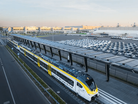Tesla Launches All-Electric Train Service in Germany

Tesla has launched its first all-electric train service in Germany, known as the "Giga Train."
The service began on 7 August 2024, connecting Erkner station to Tesla Süd and offering free transportation for both Tesla employees and the public.
This initiative is part of Tesla's broader commitment to sustainability and has significant implications for supply chain efficiency.
The Giga Train provides a free, eco-friendly commute for Tesla employees heading to Gigafactory Berlin.
This efficient transportation solution is set to optimise the workforce supply chain, improving punctuality and ensuring a steady flow of labour to the factory. The train, with a capacity of up to 500 passengers per trip, helps ease traffic congestion on regional roads.
This improvement in local infrastructure could lead to more efficient logistics operations, potentially reducing delivery times and transportation costs.
The battery-electric train is estimated to save around 50 tons of CO2 emissions per week. This substantial reduction in carbon footprint aligns with sustainable supply chain practices and may help Tesla meet environmental regulations and corporate sustainability goals.
Scalable green transportation
The success of the Giga Train could serve as a model for implementing similar sustainable transportation solutions in other regions.
This scalable solution has the potential to benefit Tesla's global supply chain by providing environmentally friendly logistics options at other manufacturing sites.
The train service, operated by Niederbarnimer Eisenbahngesellschaft (NEB), also demonstrates successful integration with existing transportation infrastructure, which could be replicated elsewhere to enhance supply chain connectivity and efficiency.
By focusing on sustainable, efficient transportation solutions like the Giga Train, Tesla is not only addressing immediate logistical needs but also paving the way for more environmentally conscious supply chain practices in the automotive industry and beyond.
Key features of the Giga Train
The Giga Train, operated by NEB, is a battery-electric train and the first of its kind in the Berlin and Brandenburg regions. It boasts several notable features:
- Capacity: The train can accommodate up to 500 passengers, with two carriages holding 120 passengers each.
- Accessibility: Designed with ground-level access and bicycle compartments for user convenience.
- Technology: Equipped with an advanced passenger information system.
By replacing an older diesel-electric rail vehicle, the Giga Train aligns with Tesla's mission to accelerate the transition to renewable energy. This shift towards electric rail transportation is a significant step in reducing carbon emissions and promoting cleaner air.
The Giga Train uses Siemens Mobility Mireo B battery-electric trains leased from Siemens Mobility subsidiary Smart Train Lease. NEB plans to gradually replace its entire diesel fleet with battery-electric and hydrogen multiple units.
The success of the Giga Train could potentially pave the way for the widespread adoption of electric trains in cities worldwide, revolutionising public transportation.
As Tesla continues to push the boundaries of electric transportation, the industry will closely monitor the performance and efficiency of this new service.
Greening supply chains
Innovations like Tesla's Giga Train could transform future supply chains by offering a highly efficient and sustainable alternative to traditional freight transport.
Utilising advanced electric propulsion and cutting-edge technology, the Giga Train significantly reduces greenhouse gas emissions and operational costs, making logistics more eco-friendly and cost-effective.
Its state-of-the-art automation and high-capacity design facilitate faster and more reliable product delivery, optimising inventory management and shortening lead times.
The integration of the Giga Train into existing supply chain networks can streamline operations, enhance distribution route flexibility, and support the global shift towards greener transportation solutions.
This innovative approach not only boosts the efficiency of goods movement but also contributes to a more sustainable and resilient supply chain infrastructure.
Receive the next edition of Scope 3 Magazine by signing up for its newsletter.
As part of this portfolio, make sure you check out Procurement Magazine and also sign up to our global conference series - Procurement & Supply Chain LIVE.
Also check out our Sister Brand, Sustainability Magazine and sign up to its global conference series - Sustainability LIVE.
Scope 3 Magazine is a BizClik brand.
- Moody’s Links Financial Pressure to ESG RiskSupply Chain Sustainability
- L’Oréal: Leading Beauty Towards a Sustainable FutureSupply Chain Sustainability
- Cyber Monday’s Environmental Cost: Scope 3 EmissionsSupply Chain Sustainability
- INVERTO: Time to Act on EU’s Supply Chain Sustainability LawSupply Chain Sustainability
Featured Articles
Estonia, Latvia and Lithuania join the European grid, cutting ties with Russian energy, a move that boosts regional security and sustainability
TÜV SÜD: New battery regulations bring Scope 3 hurdles, requiring sustainable sourcing, digital traceability and design changes increasing compliance
Nissan is scaling up its use of green steel, reducing CO2 emissions in its supply chain as part of its goal to achieve carbon neutrality by 2050

